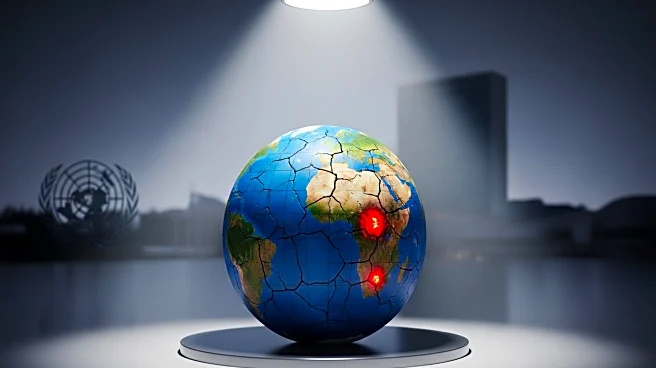What's Happening?
World leaders are convening at the United Nations General Assembly during a period marked by significant global conflicts and diplomatic challenges. The assembly, which includes representatives from about 150 of the 193 member nations, is addressing ongoing wars in Gaza and Ukraine, as well as escalating tensions in international relations. Secretary-General Antonio Guterres has highlighted the strain on international cooperation, emphasizing the need for dialogue and solutions to pressing issues such as climate change, artificial intelligence, and poverty. The assembly is also focusing on the Israeli-Palestinian conflict, with discussions on a two-state solution and the recognition of Palestine as a state. Additionally, the assembly is dealing with the implications of U.S. funding cuts to the U.N., which have led to significant budget and staff reductions.
Why It's Important?
The United Nations General Assembly serves as a critical platform for international diplomacy, especially during times of heightened global tensions. The discussions and resolutions adopted can influence international policies and aid in conflict resolution. The assembly's focus on issues like climate change, poverty, and technological advancements reflects the urgent need for global cooperation to address these challenges. The recognition of Palestine and the ongoing Israeli-Palestinian conflict are significant, as they impact regional stability and international relations. Furthermore, the U.S. funding cuts to the U.N. highlight the financial challenges faced by the organization, potentially affecting its ability to carry out peacekeeping and humanitarian missions.
What's Next?
The assembly will continue to address key global issues, with meetings scheduled on topics such as climate change, the conflict in Sudan, and the situation in Haiti. The Security Council is expected to meet on Ukraine and Gaza, potentially influencing diplomatic efforts and international responses. The U.N. will also focus on reforming its operations to better respond to current global challenges, despite financial constraints. The outcomes of these discussions could shape international policies and cooperation in the coming years.
Beyond the Headlines
The U.N.'s role in international diplomacy is crucial, yet it faces criticism for its effectiveness in resolving conflicts. The organization's ability to adapt and reform in response to global challenges will be tested, especially with reduced funding. The assembly's discussions on gender equality and poverty highlight ongoing social issues that require sustained international attention and action.










